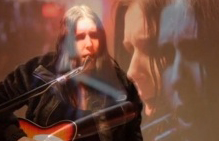OCTAVIUS: Mythmaker
Edwina Aguayo Interviews her brother Octavius about his most current album Laws
It’s almost 5:45PM and I’m waiting on my brother to pick me up for our first interview. Everything about this moment is new to me. I feel like I’ve seen the preparation for a great show, know the inspiration behind it, but have failed to see it magically put together. Although I was present during the birth of the album, in part to living under the same roof, I have yet to hear Laws in its maturity. My interest lays both in understanding my brother as the artist Octavius and seeing, feeling, and hearing how his years of hard work have paid off thus far in his musical career. “I’ll be there in fifteen minutes!” I can hear the enthusiasm in his voice, and it’s quite contagious.
I jump in the backseat, Dre Robinson is in the passenger seat making beats on his iPad, a new trend in electronic music that artists like Bjork are happily taking advantage of. My brother let’s me know that Mark Bell will be using his studio to do some mixing for Douglas J. McCarthy of Nitzer Ebb, which I can’t complain about, the more artists under one roof the better. We get to his Pasadena apartment, and I see bottles of Cote du Rhone and bowls of peanut butter stuffed pretzels, these are the staples of my brother’s vices, and it’s endearing to see how some things just don’t change.
He pours a couple glasses of table wine then places the needle on the record, and the bassline of “Apartments” quickly ties me into the track, I can’t escape. Dre sits across from me anticipating the beat. The funk bassline mixed with components of industrial create something new, I daresay avant-garde. The vocals cut like glass; sharp, precise, and painful. But that bassline, that funky bassline, keeps certain feelings from completely falling into the abyss. As we listen to the track we discuss various collaborations that occurred throughout the making of the record.
Edwina Aguayo: It sounds as though Laws wouldn’t be nearly what it is without the input of other artists.
Octavius: You’re absolutely right. It’s impossible for me to listen to my music objectively. I usually drive the production and make most of the critical decisions but I’ve always thought it best to have other musicians elevate my little ideas and add their own voodoo. I write with people I respect a great deal and I can easily slip into a mode where I’m more concerned with impressing them than the audience.
A record can begin in many different ways. Before I hand a piece of music off to someone I’m working with, it’s important to establish a pulse or an identity for the song. Because I think of music in moods, tones and emotions rather than notation, this “pulse” helps communicate what the track is, where it needs to go and how it should affect the listener. Very often I have an idea of what the finished recording should sound like but many times I haven’t a clue where things will end up.
Laws was written and engineered primarily with Adrian Sosa and Dre Robinson. Both enormously talented and accomplished musicians but the key is that they are also club DJs. It’s clear that experienced DJs are sensitive to the role music plays in a person’s life in ways I am not. While Laws certainly is not and was never intended to be a club record, it is intended to be a record for night people.
Justin Sloane was our Art Director and he’s genius-level. Seriously. Once Laws was done he moved to New York to work on the sleeve for Beyoncé’s 4. Our shared admiration of Peter Saville and the sleeves he designed for Factory Records in the late 1970s served as a benchmark for the quality of work we hoped to achieve. He brought influences like Mirko Borshe and Beni Bischof to my attention. Justin’s graphic interpretation of Laws arrived in the form of an elegant twenty-two page booklet that expertly captures the recording’s tone and intensity. This project required the designer to make a series of decisions related to structure, balance, contrast and mood. Each decision, from the placement of text to the arrangement of his elaborate pressure washer drawings, proved to elevate the project and are consistently recognized and praised in reviews of Laws.
Edwina Aguayo: It sounds as if there is a constant, steady, ambience that runs through the record. It seems to have a pace that moves at your heart rate, not too fast or too slow.
Octavius: I would attribute that to the fact that my skills are somewhat limited. We storyboard the album experience/arch but specific tempos are rarely planned. During the storyboard process we discuss themes for the beginning, middle and end. I tend to see the album as 4 sections with the first song being a section unto itself, then 2 middle sections and an ending. The middle and ending sections are usually 2 to 3 song clusters.
I try to honor the storyboard and my influences as much as possible. For Laws it was Movement, Low and Pre-Millennium Tension.
Edwina Aguayo: Is it difficult to translate this into a compelling live performance?
Octavius: Performing our records for an audience has always been somewhat difficult. The act of performing is still quite fulfilling but preparation can be tedious and the results are disappointing more often than not quite honestly. I think this is because there are so many things that must be done at a high level in an environment that’s really meant for chaos. It’s best to accept the chaos.
Additionally, I don’t view the recorded version of our songs as this perfect moment that we’re hoping to recapture. The recorded versions are a starting point — the live performance is an opportunity to make the tracks more exciting or immediate or raw. To do this, we have sessions that involve changing song arrangements to highlight the core of each track, the most essential parts. We then design sound to accompany the new distilled version of the track. The idea is to take something that may have been sonically or emotionally complex and reduce it to a single mood; then amplify the single mood. There isn’t much room for subtlety in the context of a live performance.
I’m very interested in live performance as theatre. Our music is certainly not absolved from being a form of escapism. I’m excited if, at its absolute best, people look at what we do as a beautiful, challenging waste of time.
How do you mentally prepare for a show? Do you have private rituals or a mantra…are the nerves still there?
Mostly spellwork using the gris-gris. In Voodoo, gris-gris resemble charms or talismans, which are kept for good luck or to ward off evil. A gris-gris is ritually made at an altar containing the four elements: Earth, Air, Water and Fire. The number of ingredients placed in the gris-gris is always one, three, five, seven, nine or thirteen. Ingredients are never an even number or more than thirteen. Stones and colored objects are chosen for their occult and astrological meanings corresponding to the purpose for which the gris-gris is to be used.
If it’s a really important show, things may escalate to bloodletting.
The nerves are long gone.
Edwina Aguayo: What did you discover while making Laws and how will those findings inspire or inform the next record?
Octavius: I’m really quite superstitious about terms like “inspired” because it suggests there is an alternative. Some ideas are better then others and my ability to execute my ideas is not always very good but there is never a shortage of ideas. I was lucky enough to spend the holidays in Italy visiting our mother. One of the goals of the trip was to collect concepts/ideas that will drive the tone of my work this year. These aren’t necessarily new concepts, just things I want to investigate a bit more. Here’s a short list:
Victor & Rolf
The Middle Ages
Minimal Industrial
“L’industria” ( Sounds like the title of a book of fairy-tales )
Fernando Botero
The movie “Radio On”
Edwina Aguayo: On “O, how I have sinned” there is a strong Southern gospel influence. Not entirely surprising since we grew up spending every summer in New Bern, North Carolina. We could count on going to church every Sunday and all the women in our family were part of choir, whether they sang or played piano…
Octavius: Right. I mean, what’s more eerie or reverential than religious music? I’m not necessarily a religious person but I enjoy religious imagery, texts, music and so forth. I can remember going to a ceremony called Revival when we were very young. Revival refers to a spiritual reawakening from a state of dormancy in the life of a Christian. It is initiated by a prompting of the Holy Spirit, creating an awareness of something missing or wrong in a person’s life that can only be righted by God. Basically, there are prayers and chants and singing until the Holy Spirit possesses someone. Once possessed, a person may begin to speak in tongues, scream, shout or cry uncontrollably. At 9 years old I was sitting there thinking, “is this for real?”
A few years ago I discovered a recording of a song called Millennial Reign by the great Shirley Caesar. I’d describe it as blues-funk with a small string section. The arrangement is guitar, organ, violin and bass. Her vocal performance will absolutely destroy you. I believe it was released in the early or mid 70s as she comments on segregation, the energy crisis and an upcoming presidential election just before she ends the song. After hearing Shirley Caesar I bought records by Mahalia Jackson, Mavis Staples Albertina Walker and Reverend James Cleveland and became moved to honor this music on Laws in much the same way Jason Pierce does on his Spiritualized records. Most of the music I listen to can be regarded as impressively organized sound but it’s when the work actually sounds like an emotion that’s most satisfying. Gospel music tends to have a sense of holiness that I find very cool.
Edwina Aguayo: Why do you think vision and a few tools are all anyone needs to write music? When you discuss the arrangements in Laws you use the term “sound palette” rather than musical instruments. Are these ideas related?
Octavius: Laws has very few moments where there are distinguishable instruments that sound as though a person played them. Even the parts that were played ended up being treated or manipulated in some fashion. It’s easier for me to think of individual parts as sonic events.
As we go along, I’m starting to realize that the method I use to make records has a lot of similarities with the way movies are made in that the end result is a composite of performances or events as oppose to one perfect performance. This certainly isn’t unusual in digital recording but I don’t even try to capture one perfect performance. For example, when tracking a vocal, I’ll record at least 5 takes one after the other. Once I have enough source material, I’ll edit together the best parts syllable by syllable. I have so much respect for artists that can go in and deliver timeless performances in one take. Most people are not quite that talented but good ideas and patience can often deliver a comparable result.
Edwina Aguayo: Laws succeeds in transporting the listener, allowing us to see the world through your eyes. This is especially the case with “Liars & Thieves.”
Octavius: The story itself is pure fiction but some of the details within the story actually happened. Sounding cool will always triumph over truth and most of the story is there because it sounded cool. The line, “We turned East on La Brea” is a good example. It’s not possible to turn East on La Brea in Los Angeles but to me, East sounds better than North or South. I also enjoy songs that have characters with speaking parts. Liars & Thieves has a Peruvian concierge, Tania, Josephine, a cab driver who dies in a car crash and a package store cashier. Now, the cab driver is based on the artist Tricky. Some friends and I had sushi in West Hollywood with Tricky a few years back and at one point, he asked me for a smoke. At the time I smoked menthol Newport cigarettes which he refused saying, “They’ll make you sterile”. A seemingly casual line like that gets filed away then suddenly becomes useful for a song one day. Perhaps the fact that it’s a statement made by someone who is important to me renders the story of Liars & Thieves much less contrived.
Edwina Aguayo: What are some of the changes that occur as you mature creatively?
Octavius: It’s probably true that I’ve grown less frightened by melody, structure and tradition. I’ve become much more interested in mastering the craft.
I haven’t released anything that would be considered pop but I love and respect aspects of pop music and understand how difficult it is to achieve perfect pop bliss. Pop is new, original clichés. Pop is the ability to surprise the audience when they already know how the story ends.










